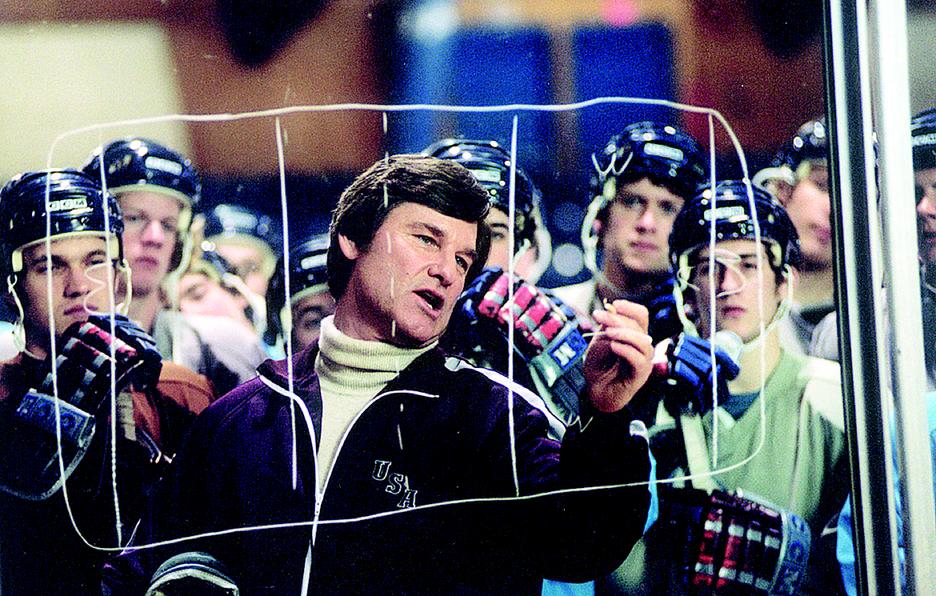Fortunately (or unfortunately, depending on your tastes), Miracle spotlights only minorly offensive coiffure, expending more energy on timeless sports-based inspiration than on antiquated grooming trends.
The film concentrates its efforts on the year 1979, when hard-nosed college hockey coach Herb Brooks (a nicely understated Kurt Russell) talks his way into running the U.S. Olympic Hockey Team, an organization that is expected to lose spectacularly to the seemingly unstoppable Russian team in the upcoming Winter Olympics. Herb thinks he's found a way to beat the Russians at their own game, however, and he lays out a bold plan for recruiting raw young talent and teaching them a whole new style of hockey.
The first half of Miracle is taken up by Herb's efforts to draft and train a highly disciplined skating machine. These hotheaded young kids (played largely by a cast of unknowns) don't know each other and don't like each other. But if there's one thing we've learned from Major League (not to mention Major League 2: Back to the Minors), it's that the scrappy, rag-tag losers are the guaranteed come-from-behind winners. Like pretty much every coach in every sports movie you've ever seen (or, for that matter, every drill sergeant in every war movie), Herb's one of those tough-love tyrants who seems like a pain-loving, order-barking ogre. It's only in the pressure-filled final period, though, when our team finally realizes that, “Hey, there is no ‘I’ in teamwork,” that we see the method behind his madness.
After the usual brutal training regimen, Miracle gets to the heart of the matter: the 1980 Winter Olympics. It is here that the full brunt of our 120-second pre-credit history lesson is brought to bear. You see, at the end of the '70s, Americans were uptight, unhappy and had reached the absolute limit of their “grooviness.” We had the hostage situation in Iran to worry about. We had Three Mile Island. We had Andy Gibb. We needed a bunch of shaggy-maned underdogs to help us forget our troubles, restore our national pride and usher in the jingoistic, xenophobic era of Ronald Reagan.
The miracle of Miracle is that it builds drama and tension from an outcome that's already predetermined. We all know what happened. We won. We beat the Russians. We dubbed it “The Miracle on Ice.” We ran clips on “Wide World of Sports” every Saturday morning. Yet, sitting in the theater watching Our Boys skate their little hearts out, it's hard not to build up a healthy sweat of concern. “What if they don't win?”
The hockey matches are shot with a great deal of energy. The camera whips around the arena, catching each glass-rattling collision, each buzzer-triggering slapshot. Thankfully, director Gavin O'Connor (maker of the humble 1999 Sundance winner Tumbleweeds) has skated clear of stereotypical slo-mo sequences for a quick-cut style that matches well with the fast-paced world of ice hockey. Thankfully, the cast members have all been recruited for their skating skills as well as their acting skills, and their abilities show in the exciting and authentic hockey sequences.
For all its skill and grace on the ice, though, Miracle is a tad ungainly on solid ground. Herb Brooks' domestic travails (his wife thinks he doesn't spend enough time at home) seem like small potatoes. As Mrs. Brooks, Patricia Clarkson (recent Golden Globe nominee for her work in Pieces of April) seems sorely underused. This is, after all, a boys' game. But even when it comes to the locker room drama, Miracle feels a bit ham-handed. It doesn't take a genius to figure out the film's metaphor: The squabbling between would-be teammates is a microcosm for the international animosity between America and Russia. And yet, first-time screenwriter Eric Guggenheim still feels the need to include lengthy scenes in which characters explain how the team is “like our own little Cold War.” We get it, Eric.
Despite its predictability and its occasionally overplayed emotions, Miracle is a winning drama sure to milk a tear and a cheer from Monday morning quarterbacks and patriotic sports lovers of all stripe.



